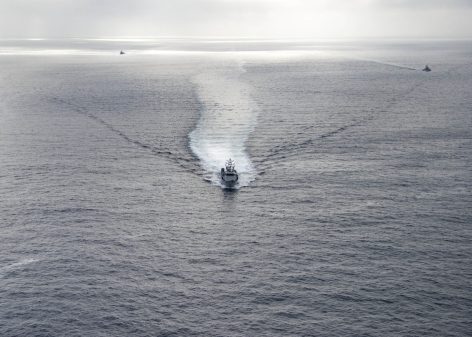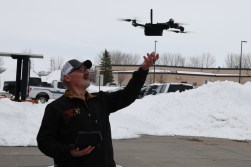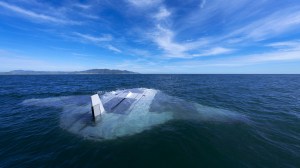Austin jets to DIU after inking new counter-drone strategy

MOFFETT FIELD, Calif. — Pentagon chief Lloyd Austin spent much of Friday touring the Defense Innovation Unit’s Silicon Valley headquarters, where he observed commercial counter-drone technology demonstrations and participated in closed-door discussions with the hub’s director Doug Beck and several top portfolio leads.
The visit came a day after Austin issued a new classified strategy laying out the department’s contemporary approach for defeating intensifying uncrewed system threats to U.S. military personnel and assets.
DIU was stood up nearly 10 years ago in California by then Defense Secretary Ash Carter, to help bridge the gap between the commercial sector and the Pentagon, bring new vendors into the department’s acquisition fold and accelerate the procurement of new capabilities. The unit has grown in prominence since then, with expanded technology focus areas and additional outposts in other tech hubs across the United States. After he became SecDef, Austin elevated the organization to report directly to him. Earlier this year, Beck unveiled a new strategy known as DIU 3.0.
The innovation accelerator has seven focus areas: AI, autonomy, cyber and telecom, emerging tech, energy, “human systems” and space. It’s playing a key role in DOD’s Replicator initiative, which aims to field thousands of autonomous uncrewed platforms, counter-drone systems and other capabilities to counter China’s military buildup in the Indo-Pacific.
On Friday, Austin, Beck and other officials received updates on the latest acceleration activities of the unit, but the priority focus of the day encompassed counter-drone technologies.
Much of the event was closed to the press, but briefers told reporters that the secretary also heard from acquisitions, commercial, space and cyber leads.
“The things that you’re working on are making a difference, not just to [the] United States military, but to [the] entire world. Believe it or not, for so many people around the world, different militaries that know who DIU is, know what you’re doing, [the] kinds of things you’re doing, and they want to come and interact with you because they know how important” the unit’s work is, Austin told DIU personnel. “If I go to Australia, which I was just there recently, I go to India, if I go to the U.K., to France, everybody is asking me about DIU and how can they stand up an organization like you? … And that’s because of the great work that you’re doing and the fact that you’re doing things that are making a difference to the warfighter.”
“People around the world see you. They understand what you’re doing, and they want to be like you. That’s not hyperbole — that’s the truth,” he said.
This stop at the innovation unit marked the first leg on a five-day trip that the secretary, his delegation and a small group of reporters are participating in through Dec. 11, to California and several military bases in Japan.
On Saturday, Austin will deliver a keynote address at the annual Reagan National Defense Forum. This is his fourth year attending the summit. From there, he’s traveling to Tokyo for a multi-day stop that will be his 13th visit to the Indo-Pacific as SecDef.






